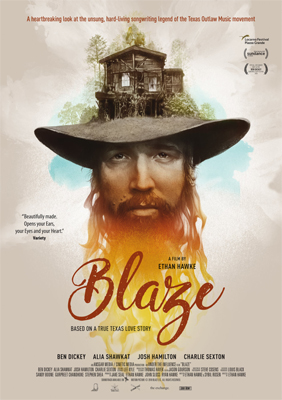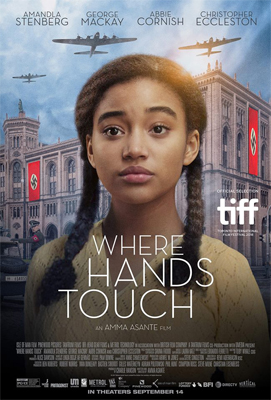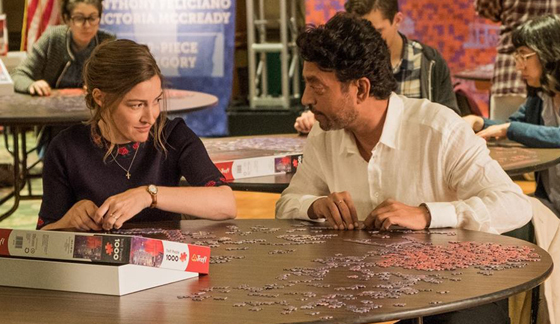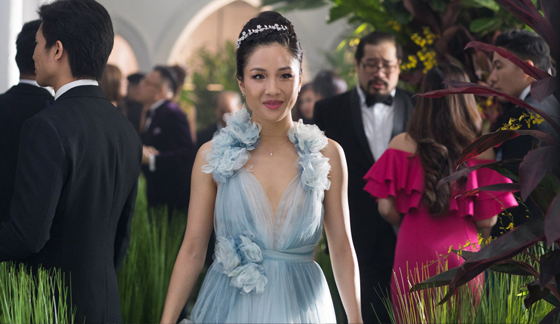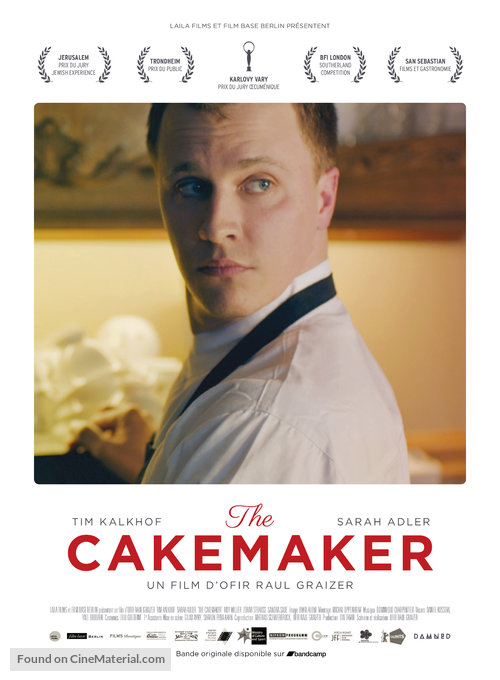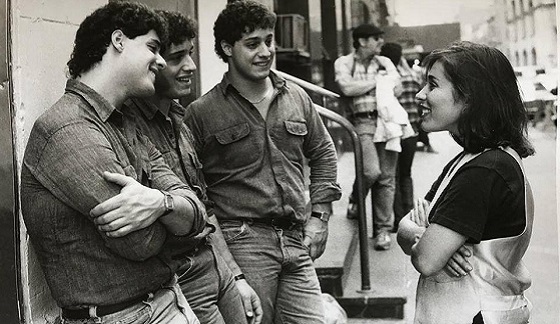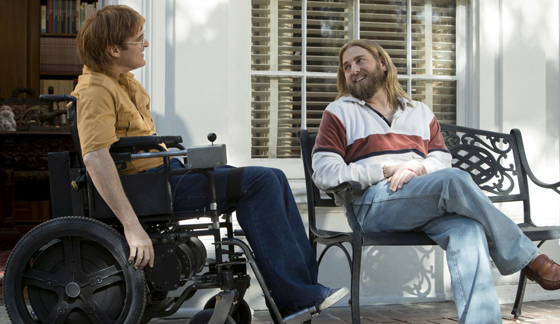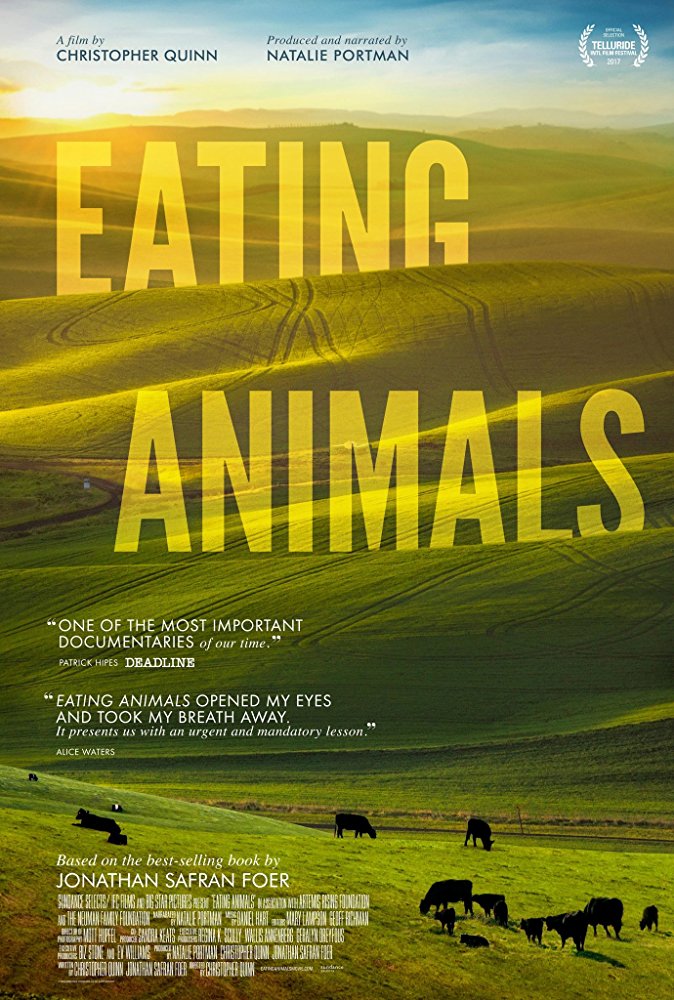BLAZE
Starring: Ben Dickey, Alia Shawkat
Directed by: Ethan Hawke
Rated: R
Running Time: 2 hrs 9 mins
IFC
Having grown up listening to the music of country artists like Johnny Cash, Merle Haggard, Waylon Jennings, Willie Nelson, etc., I was surprised I had never heard of Blaze Foley (1949-89). After watching the biopic of the obscure yet influential Austin-based singer/songwriter, I felt saddened that he did not realize the full potential of his artistry. “Blaze” is a tragic tale that flows like a sad country song with little in the way of silver linings. Based upon the 2008 memoir “Living in the Woods in a Tree: Remembering Blaze” by Foley’s ex-wife Sybil Rosen, “Blaze” features a powerful breakthrough performance by musician Ben Dickey in an emotionally complex role. Unfortunately, writer/director Ethan Hawke’s endeavor is so draggy at times that it makes a meandering creek look like a raging river.
Hawke bravely chose to tell his tale from three different time lines – sometime after the death of Foley within the confines of a radio booth interview; the night of Foley’s death; and the beginnings of his life as an artist when he meets Rosen (Alia Shawkat, “The To Do List”). The interview portion is entertaining as we watch Hawke, who never exposes his face, interview Foley’s friends – singer/songwriter Townes Van Zandt (Charlie Sexton), who had his own demons to deal with, and Zee (Josh Hamilton). Van Zandt embellishes to the point where you don’t know if he is telling the truth or creating the lyrics to another lonely country song.
The portions involving the night of Foley’s death are rather lackluster. Of course, some of the edge is taken off because we know what’s coming, but Hawke fails to make us feel like we are dancing along a razor. It plays more like a Hank Williams, Jr. tune that never made the final cut in the editing room. Dickey still manages to be a steady presence on the silver screen, but it’s the story of his innocent beginnings with Rosen that truly grab our attention and leave the most lasting impression.
Much of the story’s focus, and rightfully so since Hawke heavily used the real Rosen’s novel, is on the years when Foley and Rosen met, and lived for a time in a tree house. Dickey towers in these sentimental scenes like a seasoned veteran of the acting craft. While he sometimes forgets to maintain the limp Foley had, Dickey appears to capture the man’s essence with breathless ease. He hits every note with perfection as he portrays a man who fell hard from carefree joy and blossoming artistry into a dark haze of alcohol and drugs that cost him everything – love, career and life.
“Blaze” is a tragic story, yet if you subtract Dickey from the equation it feels stuck in neutral while cameos by a pair of stars, one a recent Oscar winner, feel contrived and over the top. Overall, it’s a story that could have used a lot tightening up and more cohesivity. Otherwise, Hawke’s effort falls short of his other tragic-musician tale in the form of 2015’s fantastic “Born to Be Blue.”
Having grown up listening to the music of country artists like Johnny Cash, Merle Haggard, Waylon Jennings, Willie Nelson, etc., I was surprised I had never heard of Blaze Foley (1949-89). After watching the biopic of the obscure yet influential Austin-based singer/songwriter, I felt saddened that he did not realize the full potential of his artistry. “Blaze” is a tragic tale that flows like a sad country song with little in the way of silver linings. Based upon the 2008 memoir “Living in the Woods in a Tree: Remembering Blaze” by Foley’s ex-wife Sybil Rosen, “Blaze” features a powerful breakthrough performance by musician Ben Dickey in an emotionally complex role. Unfortunately, writer/director Ethan Hawke’s endeavor is so draggy at times that it makes a meandering creek look like a raging river.
Hawke bravely chose to tell his tale from three different time lines – sometime after the death of Foley within the confines of a radio booth interview; the night of Foley’s death; and the beginnings of his life as an artist when he meets Rosen (Alia Shawkat, “The To Do List”). The interview portion is entertaining as we watch Hawke, who never exposes his face, interview Foley’s friends – singer/songwriter Townes Van Zandt (Charlie Sexton), who had his own demons to deal with, and Zee (Josh Hamilton). Van Zandt embellishes to the point where you don’t know if he is telling the truth or creating the lyrics to another lonely country song.
The portions involving the night of Foley’s death are rather lackluster. Of course, some of the edge is taken off because we know what’s coming, but Hawke fails to make us feel like we are dancing along a razor. It plays more like a Hank Williams, Jr. tune that never made the final cut in the editing room. Dickey still manages to be a steady presence on the silver screen, but it’s the story of his innocent beginnings with Rosen that truly grab our attention and leave the most lasting impression.
Much of the story’s focus, and rightfully so since Hawke heavily used the real Rosen’s novel, is on the years when Foley and Rosen met, and lived for a time in a tree house. Dickey towers in these sentimental scenes like a seasoned veteran of the acting craft. While he sometimes forgets to maintain the limp Foley had, Dickey appears to capture the man’s essence with breathless ease. He hits every note with perfection as he portrays a man who fell hard from carefree joy and blossoming artistry into a dark haze of alcohol and drugs that cost him everything – love, career and life.
“Blaze” is a tragic story, yet if you subtract Dickey from the equation it feels stuck in neutral while cameos by a pair of stars, one a recent Oscar winner, feel contrived and over the top. Overall, it’s a story that could have used a lot tightening up and more cohesivity. Otherwise, Hawke’s effort falls short of his other tragic-musician tale in the form of 2015’s fantastic “Born to Be Blue.”
Related Content



